Financial Services Regulation: Corporate Governance and Reforms
VerifiedAdded on 2022/09/27
|15
|4251
|21
Report
AI Summary
This research paper analyzes the Final Report by Commissioner Hayne on Financial Services Regulation, released in February 2019, and the government's response. It examines the failures in organizational culture, governance arrangements, and remuneration systems that led to misconduct in the financial services industry. The report emphasizes the importance of board and management separation, assigning liability for governance and culture assessment. It highlights key recommendations, including those supported by the AICD, such as regular governance assessments and a focus on non-financial metrics. The paper explores the implications for directors, reinforces fundamental governance tenets, and discusses the AICD's views on the recommendations. Case studies of NAB and CBA are analyzed to highlight the importance of information flow and board challenge. The report also addresses superannuation reforms, including civil penalties for breaches of covenants. The research paper underscores the need for improved information quality, management and board collaboration, and a focus on overall corporate regulation rather than day-to-day affairs. It provides valuable insights into the future of financial regulation and governance.
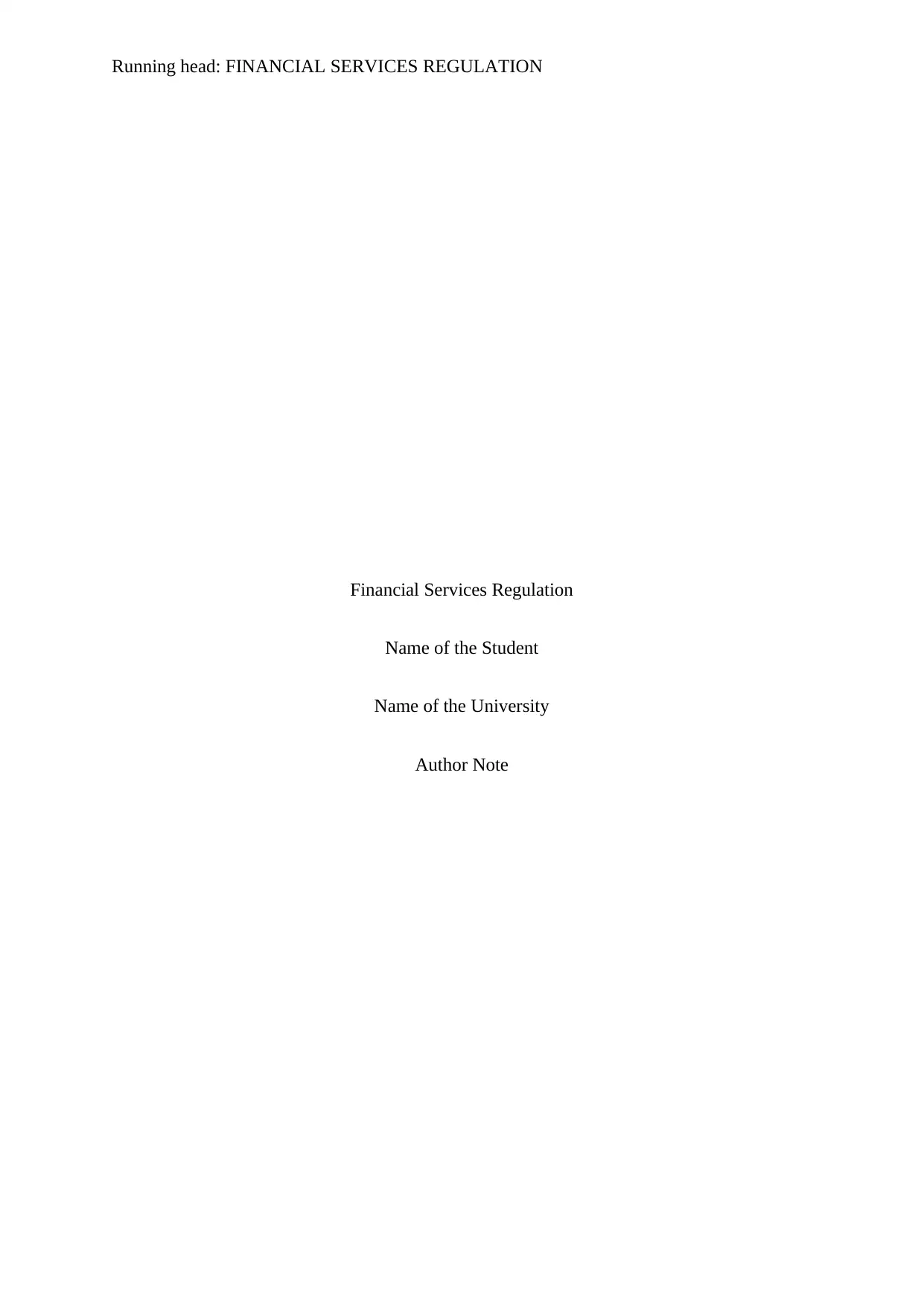
Running head: FINANCIAL SERVICES REGULATION
Financial Services Regulation
Name of the Student
Name of the University
Author Note
Financial Services Regulation
Name of the Student
Name of the University
Author Note
Paraphrase This Document
Need a fresh take? Get an instant paraphrase of this document with our AI Paraphraser
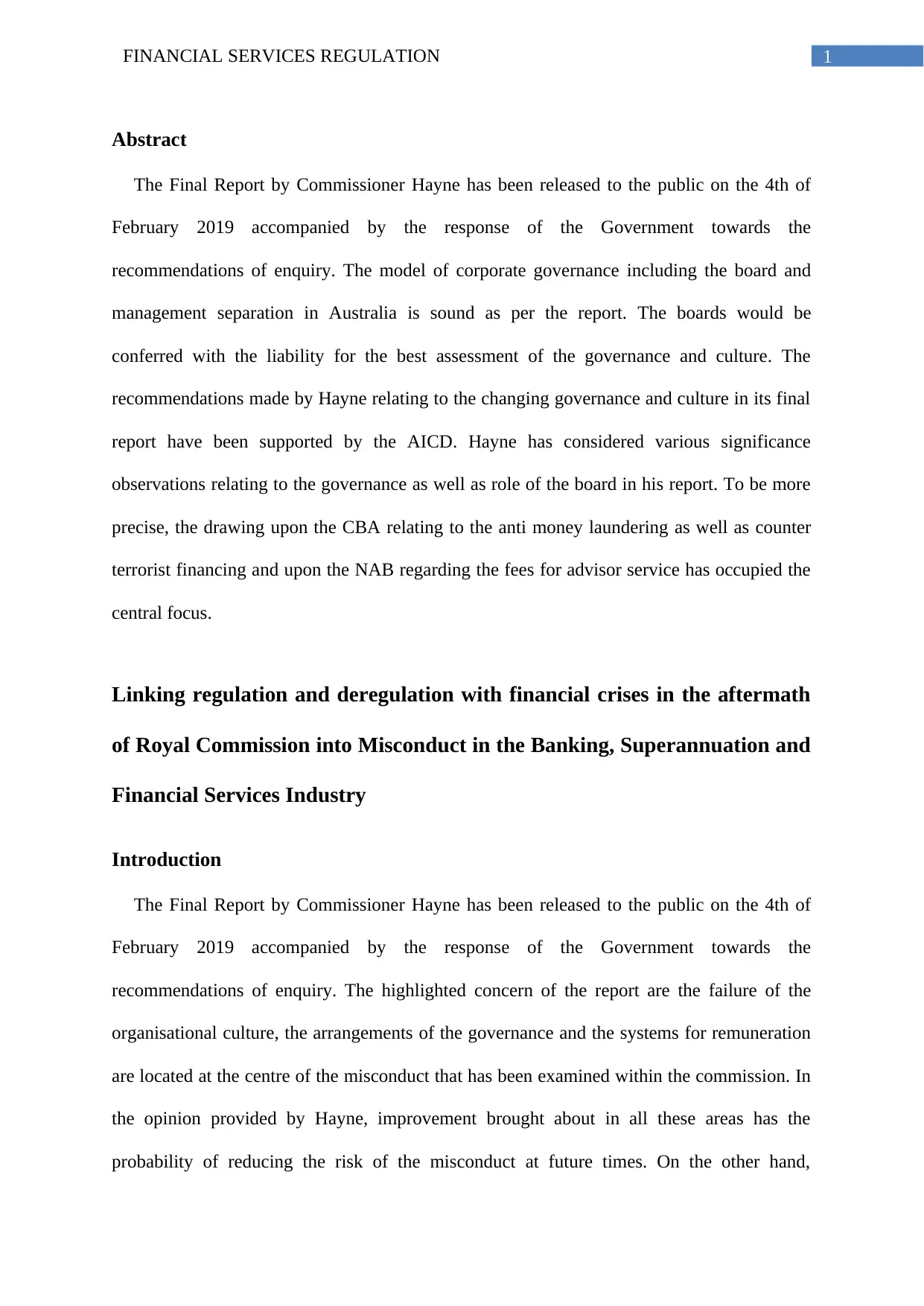
1FINANCIAL SERVICES REGULATION
Abstract
The Final Report by Commissioner Hayne has been released to the public on the 4th of
February 2019 accompanied by the response of the Government towards the
recommendations of enquiry. The model of corporate governance including the board and
management separation in Australia is sound as per the report. The boards would be
conferred with the liability for the best assessment of the governance and culture. The
recommendations made by Hayne relating to the changing governance and culture in its final
report have been supported by the AICD. Hayne has considered various significance
observations relating to the governance as well as role of the board in his report. To be more
precise, the drawing upon the CBA relating to the anti money laundering as well as counter
terrorist financing and upon the NAB regarding the fees for advisor service has occupied the
central focus.
Linking regulation and deregulation with financial crises in the aftermath
of Royal Commission into Misconduct in the Banking, Superannuation and
Financial Services Industry
Introduction
The Final Report by Commissioner Hayne has been released to the public on the 4th of
February 2019 accompanied by the response of the Government towards the
recommendations of enquiry. The highlighted concern of the report are the failure of the
organisational culture, the arrangements of the governance and the systems for remuneration
are located at the centre of the misconduct that has been examined within the commission. In
the opinion provided by Hayne, improvement brought about in all these areas has the
probability of reducing the risk of the misconduct at future times. On the other hand,
Abstract
The Final Report by Commissioner Hayne has been released to the public on the 4th of
February 2019 accompanied by the response of the Government towards the
recommendations of enquiry. The model of corporate governance including the board and
management separation in Australia is sound as per the report. The boards would be
conferred with the liability for the best assessment of the governance and culture. The
recommendations made by Hayne relating to the changing governance and culture in its final
report have been supported by the AICD. Hayne has considered various significance
observations relating to the governance as well as role of the board in his report. To be more
precise, the drawing upon the CBA relating to the anti money laundering as well as counter
terrorist financing and upon the NAB regarding the fees for advisor service has occupied the
central focus.
Linking regulation and deregulation with financial crises in the aftermath
of Royal Commission into Misconduct in the Banking, Superannuation and
Financial Services Industry
Introduction
The Final Report by Commissioner Hayne has been released to the public on the 4th of
February 2019 accompanied by the response of the Government towards the
recommendations of enquiry. The highlighted concern of the report are the failure of the
organisational culture, the arrangements of the governance and the systems for remuneration
are located at the centre of the misconduct that has been examined within the commission. In
the opinion provided by Hayne, improvement brought about in all these areas has the
probability of reducing the risk of the misconduct at future times. On the other hand,
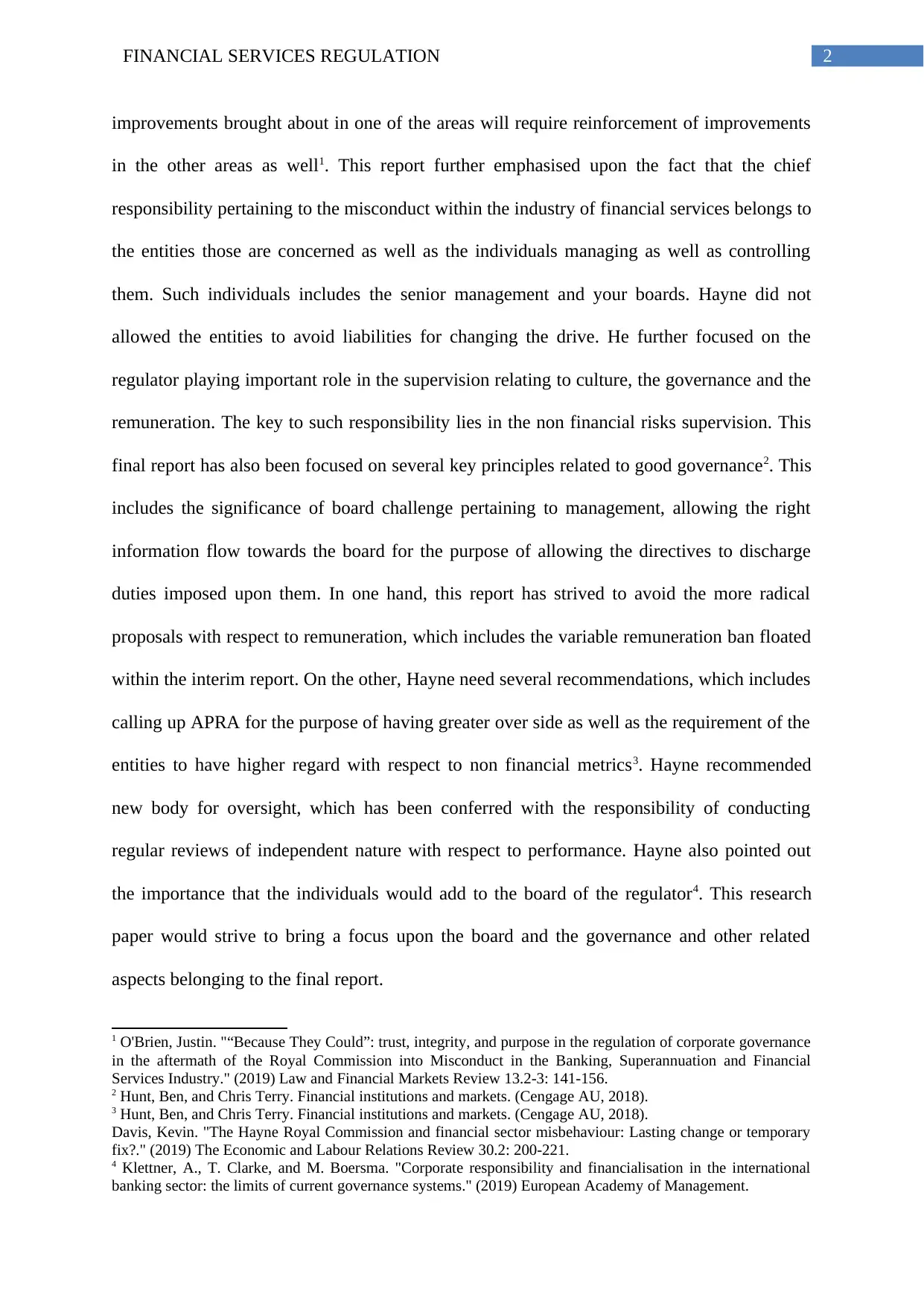
2FINANCIAL SERVICES REGULATION
improvements brought about in one of the areas will require reinforcement of improvements
in the other areas as well1. This report further emphasised upon the fact that the chief
responsibility pertaining to the misconduct within the industry of financial services belongs to
the entities those are concerned as well as the individuals managing as well as controlling
them. Such individuals includes the senior management and your boards. Hayne did not
allowed the entities to avoid liabilities for changing the drive. He further focused on the
regulator playing important role in the supervision relating to culture, the governance and the
remuneration. The key to such responsibility lies in the non financial risks supervision. This
final report has also been focused on several key principles related to good governance2. This
includes the significance of board challenge pertaining to management, allowing the right
information flow towards the board for the purpose of allowing the directives to discharge
duties imposed upon them. In one hand, this report has strived to avoid the more radical
proposals with respect to remuneration, which includes the variable remuneration ban floated
within the interim report. On the other, Hayne need several recommendations, which includes
calling up APRA for the purpose of having greater over side as well as the requirement of the
entities to have higher regard with respect to non financial metrics3. Hayne recommended
new body for oversight, which has been conferred with the responsibility of conducting
regular reviews of independent nature with respect to performance. Hayne also pointed out
the importance that the individuals would add to the board of the regulator4. This research
paper would strive to bring a focus upon the board and the governance and other related
aspects belonging to the final report.
1 O'Brien, Justin. "“Because They Could”: trust, integrity, and purpose in the regulation of corporate governance
in the aftermath of the Royal Commission into Misconduct in the Banking, Superannuation and Financial
Services Industry." (2019) Law and Financial Markets Review 13.2-3: 141-156.
2 Hunt, Ben, and Chris Terry. Financial institutions and markets. (Cengage AU, 2018).
3 Hunt, Ben, and Chris Terry. Financial institutions and markets. (Cengage AU, 2018).
Davis, Kevin. "The Hayne Royal Commission and financial sector misbehaviour: Lasting change or temporary
fix?." (2019) The Economic and Labour Relations Review 30.2: 200-221.
4 Klettner, A., T. Clarke, and M. Boersma. "Corporate responsibility and financialisation in the international
banking sector: the limits of current governance systems." (2019) European Academy of Management.
improvements brought about in one of the areas will require reinforcement of improvements
in the other areas as well1. This report further emphasised upon the fact that the chief
responsibility pertaining to the misconduct within the industry of financial services belongs to
the entities those are concerned as well as the individuals managing as well as controlling
them. Such individuals includes the senior management and your boards. Hayne did not
allowed the entities to avoid liabilities for changing the drive. He further focused on the
regulator playing important role in the supervision relating to culture, the governance and the
remuneration. The key to such responsibility lies in the non financial risks supervision. This
final report has also been focused on several key principles related to good governance2. This
includes the significance of board challenge pertaining to management, allowing the right
information flow towards the board for the purpose of allowing the directives to discharge
duties imposed upon them. In one hand, this report has strived to avoid the more radical
proposals with respect to remuneration, which includes the variable remuneration ban floated
within the interim report. On the other, Hayne need several recommendations, which includes
calling up APRA for the purpose of having greater over side as well as the requirement of the
entities to have higher regard with respect to non financial metrics3. Hayne recommended
new body for oversight, which has been conferred with the responsibility of conducting
regular reviews of independent nature with respect to performance. Hayne also pointed out
the importance that the individuals would add to the board of the regulator4. This research
paper would strive to bring a focus upon the board and the governance and other related
aspects belonging to the final report.
1 O'Brien, Justin. "“Because They Could”: trust, integrity, and purpose in the regulation of corporate governance
in the aftermath of the Royal Commission into Misconduct in the Banking, Superannuation and Financial
Services Industry." (2019) Law and Financial Markets Review 13.2-3: 141-156.
2 Hunt, Ben, and Chris Terry. Financial institutions and markets. (Cengage AU, 2018).
3 Hunt, Ben, and Chris Terry. Financial institutions and markets. (Cengage AU, 2018).
Davis, Kevin. "The Hayne Royal Commission and financial sector misbehaviour: Lasting change or temporary
fix?." (2019) The Economic and Labour Relations Review 30.2: 200-221.
4 Klettner, A., T. Clarke, and M. Boersma. "Corporate responsibility and financialisation in the international
banking sector: the limits of current governance systems." (2019) European Academy of Management.
⊘ This is a preview!⊘
Do you want full access?
Subscribe today to unlock all pages.

Trusted by 1+ million students worldwide
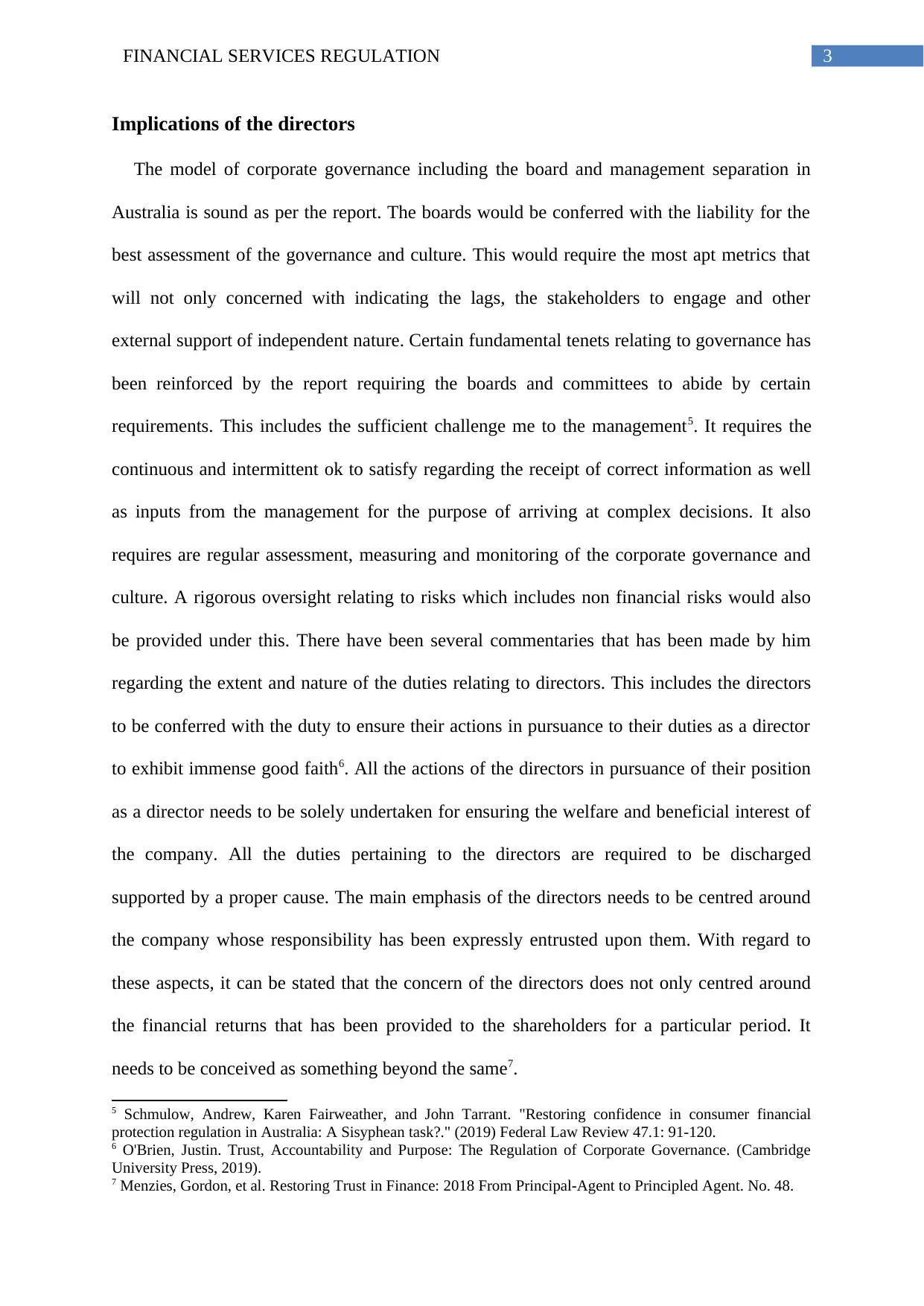
3FINANCIAL SERVICES REGULATION
Implications of the directors
The model of corporate governance including the board and management separation in
Australia is sound as per the report. The boards would be conferred with the liability for the
best assessment of the governance and culture. This would require the most apt metrics that
will not only concerned with indicating the lags, the stakeholders to engage and other
external support of independent nature. Certain fundamental tenets relating to governance has
been reinforced by the report requiring the boards and committees to abide by certain
requirements. This includes the sufficient challenge me to the management5. It requires the
continuous and intermittent ok to satisfy regarding the receipt of correct information as well
as inputs from the management for the purpose of arriving at complex decisions. It also
requires are regular assessment, measuring and monitoring of the corporate governance and
culture. A rigorous oversight relating to risks which includes non financial risks would also
be provided under this. There have been several commentaries that has been made by him
regarding the extent and nature of the duties relating to directors. This includes the directors
to be conferred with the duty to ensure their actions in pursuance to their duties as a director
to exhibit immense good faith6. All the actions of the directors in pursuance of their position
as a director needs to be solely undertaken for ensuring the welfare and beneficial interest of
the company. All the duties pertaining to the directors are required to be discharged
supported by a proper cause. The main emphasis of the directors needs to be centred around
the company whose responsibility has been expressly entrusted upon them. With regard to
these aspects, it can be stated that the concern of the directors does not only centred around
the financial returns that has been provided to the shareholders for a particular period. It
needs to be conceived as something beyond the same7.
5 Schmulow, Andrew, Karen Fairweather, and John Tarrant. "Restoring confidence in consumer financial
protection regulation in Australia: A Sisyphean task?." (2019) Federal Law Review 47.1: 91-120.
6 O'Brien, Justin. Trust, Accountability and Purpose: The Regulation of Corporate Governance. (Cambridge
University Press, 2019).
7 Menzies, Gordon, et al. Restoring Trust in Finance: 2018 From Principal-Agent to Principled Agent. No. 48.
Implications of the directors
The model of corporate governance including the board and management separation in
Australia is sound as per the report. The boards would be conferred with the liability for the
best assessment of the governance and culture. This would require the most apt metrics that
will not only concerned with indicating the lags, the stakeholders to engage and other
external support of independent nature. Certain fundamental tenets relating to governance has
been reinforced by the report requiring the boards and committees to abide by certain
requirements. This includes the sufficient challenge me to the management5. It requires the
continuous and intermittent ok to satisfy regarding the receipt of correct information as well
as inputs from the management for the purpose of arriving at complex decisions. It also
requires are regular assessment, measuring and monitoring of the corporate governance and
culture. A rigorous oversight relating to risks which includes non financial risks would also
be provided under this. There have been several commentaries that has been made by him
regarding the extent and nature of the duties relating to directors. This includes the directors
to be conferred with the duty to ensure their actions in pursuance to their duties as a director
to exhibit immense good faith6. All the actions of the directors in pursuance of their position
as a director needs to be solely undertaken for ensuring the welfare and beneficial interest of
the company. All the duties pertaining to the directors are required to be discharged
supported by a proper cause. The main emphasis of the directors needs to be centred around
the company whose responsibility has been expressly entrusted upon them. With regard to
these aspects, it can be stated that the concern of the directors does not only centred around
the financial returns that has been provided to the shareholders for a particular period. It
needs to be conceived as something beyond the same7.
5 Schmulow, Andrew, Karen Fairweather, and John Tarrant. "Restoring confidence in consumer financial
protection regulation in Australia: A Sisyphean task?." (2019) Federal Law Review 47.1: 91-120.
6 O'Brien, Justin. Trust, Accountability and Purpose: The Regulation of Corporate Governance. (Cambridge
University Press, 2019).
7 Menzies, Gordon, et al. Restoring Trust in Finance: 2018 From Principal-Agent to Principled Agent. No. 48.
Paraphrase This Document
Need a fresh take? Get an instant paraphrase of this document with our AI Paraphraser
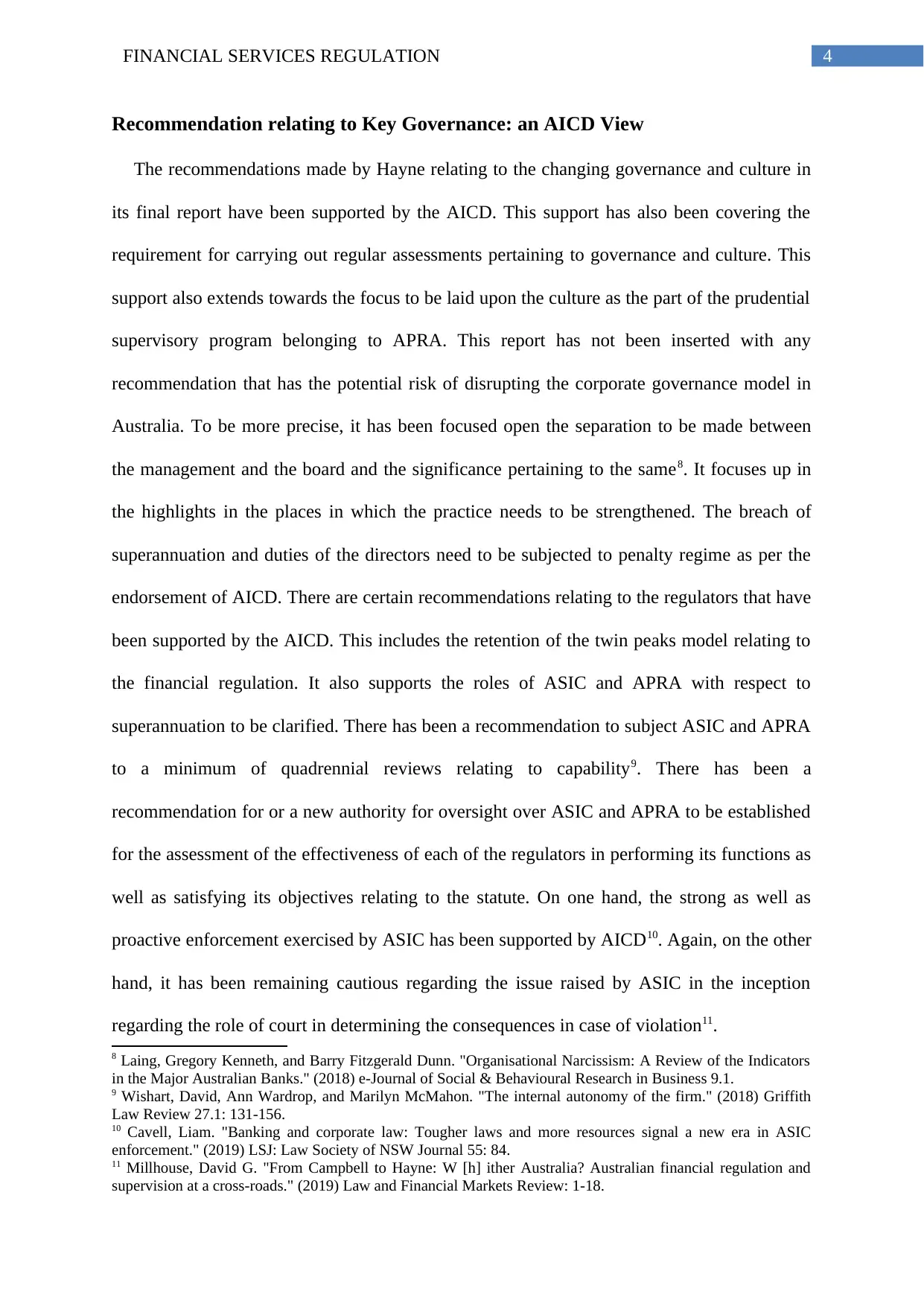
4FINANCIAL SERVICES REGULATION
Recommendation relating to Key Governance: an AICD View
The recommendations made by Hayne relating to the changing governance and culture in
its final report have been supported by the AICD. This support has also been covering the
requirement for carrying out regular assessments pertaining to governance and culture. This
support also extends towards the focus to be laid upon the culture as the part of the prudential
supervisory program belonging to APRA. This report has not been inserted with any
recommendation that has the potential risk of disrupting the corporate governance model in
Australia. To be more precise, it has been focused open the separation to be made between
the management and the board and the significance pertaining to the same8. It focuses up in
the highlights in the places in which the practice needs to be strengthened. The breach of
superannuation and duties of the directors need to be subjected to penalty regime as per the
endorsement of AICD. There are certain recommendations relating to the regulators that have
been supported by the AICD. This includes the retention of the twin peaks model relating to
the financial regulation. It also supports the roles of ASIC and APRA with respect to
superannuation to be clarified. There has been a recommendation to subject ASIC and APRA
to a minimum of quadrennial reviews relating to capability9. There has been a
recommendation for or a new authority for oversight over ASIC and APRA to be established
for the assessment of the effectiveness of each of the regulators in performing its functions as
well as satisfying its objectives relating to the statute. On one hand, the strong as well as
proactive enforcement exercised by ASIC has been supported by AICD10. Again, on the other
hand, it has been remaining cautious regarding the issue raised by ASIC in the inception
regarding the role of court in determining the consequences in case of violation11.
8 Laing, Gregory Kenneth, and Barry Fitzgerald Dunn. "Organisational Narcissism: A Review of the Indicators
in the Major Australian Banks." (2018) e-Journal of Social & Behavioural Research in Business 9.1.
9 Wishart, David, Ann Wardrop, and Marilyn McMahon. "The internal autonomy of the firm." (2018) Griffith
Law Review 27.1: 131-156.
10 Cavell, Liam. "Banking and corporate law: Tougher laws and more resources signal a new era in ASIC
enforcement." (2019) LSJ: Law Society of NSW Journal 55: 84.
11 Millhouse, David G. "From Campbell to Hayne: W [h] ither Australia? Australian financial regulation and
supervision at a cross-roads." (2019) Law and Financial Markets Review: 1-18.
Recommendation relating to Key Governance: an AICD View
The recommendations made by Hayne relating to the changing governance and culture in
its final report have been supported by the AICD. This support has also been covering the
requirement for carrying out regular assessments pertaining to governance and culture. This
support also extends towards the focus to be laid upon the culture as the part of the prudential
supervisory program belonging to APRA. This report has not been inserted with any
recommendation that has the potential risk of disrupting the corporate governance model in
Australia. To be more precise, it has been focused open the separation to be made between
the management and the board and the significance pertaining to the same8. It focuses up in
the highlights in the places in which the practice needs to be strengthened. The breach of
superannuation and duties of the directors need to be subjected to penalty regime as per the
endorsement of AICD. There are certain recommendations relating to the regulators that have
been supported by the AICD. This includes the retention of the twin peaks model relating to
the financial regulation. It also supports the roles of ASIC and APRA with respect to
superannuation to be clarified. There has been a recommendation to subject ASIC and APRA
to a minimum of quadrennial reviews relating to capability9. There has been a
recommendation for or a new authority for oversight over ASIC and APRA to be established
for the assessment of the effectiveness of each of the regulators in performing its functions as
well as satisfying its objectives relating to the statute. On one hand, the strong as well as
proactive enforcement exercised by ASIC has been supported by AICD10. Again, on the other
hand, it has been remaining cautious regarding the issue raised by ASIC in the inception
regarding the role of court in determining the consequences in case of violation11.
8 Laing, Gregory Kenneth, and Barry Fitzgerald Dunn. "Organisational Narcissism: A Review of the Indicators
in the Major Australian Banks." (2018) e-Journal of Social & Behavioural Research in Business 9.1.
9 Wishart, David, Ann Wardrop, and Marilyn McMahon. "The internal autonomy of the firm." (2018) Griffith
Law Review 27.1: 131-156.
10 Cavell, Liam. "Banking and corporate law: Tougher laws and more resources signal a new era in ASIC
enforcement." (2019) LSJ: Law Society of NSW Journal 55: 84.
11 Millhouse, David G. "From Campbell to Hayne: W [h] ither Australia? Australian financial regulation and
supervision at a cross-roads." (2019) Law and Financial Markets Review: 1-18.
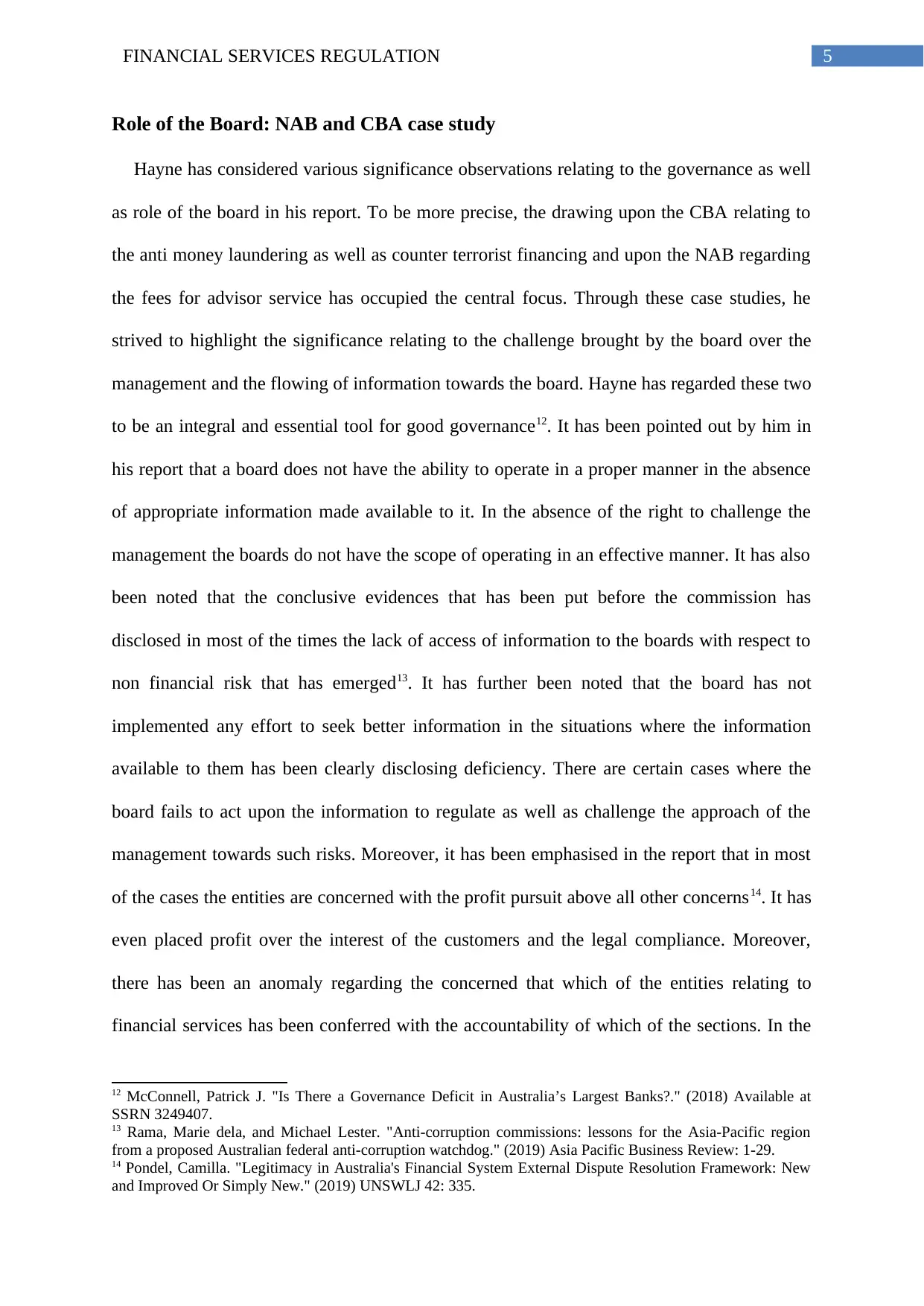
5FINANCIAL SERVICES REGULATION
Role of the Board: NAB and CBA case study
Hayne has considered various significance observations relating to the governance as well
as role of the board in his report. To be more precise, the drawing upon the CBA relating to
the anti money laundering as well as counter terrorist financing and upon the NAB regarding
the fees for advisor service has occupied the central focus. Through these case studies, he
strived to highlight the significance relating to the challenge brought by the board over the
management and the flowing of information towards the board. Hayne has regarded these two
to be an integral and essential tool for good governance12. It has been pointed out by him in
his report that a board does not have the ability to operate in a proper manner in the absence
of appropriate information made available to it. In the absence of the right to challenge the
management the boards do not have the scope of operating in an effective manner. It has also
been noted that the conclusive evidences that has been put before the commission has
disclosed in most of the times the lack of access of information to the boards with respect to
non financial risk that has emerged13. It has further been noted that the board has not
implemented any effort to seek better information in the situations where the information
available to them has been clearly disclosing deficiency. There are certain cases where the
board fails to act upon the information to regulate as well as challenge the approach of the
management towards such risks. Moreover, it has been emphasised in the report that in most
of the cases the entities are concerned with the profit pursuit above all other concerns14. It has
even placed profit over the interest of the customers and the legal compliance. Moreover,
there has been an anomaly regarding the concerned that which of the entities relating to
financial services has been conferred with the accountability of which of the sections. In the
12 McConnell, Patrick J. "Is There a Governance Deficit in Australia’s Largest Banks?." (2018) Available at
SSRN 3249407.
13 Rama, Marie dela, and Michael Lester. "Anti-corruption commissions: lessons for the Asia-Pacific region
from a proposed Australian federal anti-corruption watchdog." (2019) Asia Pacific Business Review: 1-29.
14 Pondel, Camilla. "Legitimacy in Australia's Financial System External Dispute Resolution Framework: New
and Improved Or Simply New." (2019) UNSWLJ 42: 335.
Role of the Board: NAB and CBA case study
Hayne has considered various significance observations relating to the governance as well
as role of the board in his report. To be more precise, the drawing upon the CBA relating to
the anti money laundering as well as counter terrorist financing and upon the NAB regarding
the fees for advisor service has occupied the central focus. Through these case studies, he
strived to highlight the significance relating to the challenge brought by the board over the
management and the flowing of information towards the board. Hayne has regarded these two
to be an integral and essential tool for good governance12. It has been pointed out by him in
his report that a board does not have the ability to operate in a proper manner in the absence
of appropriate information made available to it. In the absence of the right to challenge the
management the boards do not have the scope of operating in an effective manner. It has also
been noted that the conclusive evidences that has been put before the commission has
disclosed in most of the times the lack of access of information to the boards with respect to
non financial risk that has emerged13. It has further been noted that the board has not
implemented any effort to seek better information in the situations where the information
available to them has been clearly disclosing deficiency. There are certain cases where the
board fails to act upon the information to regulate as well as challenge the approach of the
management towards such risks. Moreover, it has been emphasised in the report that in most
of the cases the entities are concerned with the profit pursuit above all other concerns14. It has
even placed profit over the interest of the customers and the legal compliance. Moreover,
there has been an anomaly regarding the concerned that which of the entities relating to
financial services has been conferred with the accountability of which of the sections. In the
12 McConnell, Patrick J. "Is There a Governance Deficit in Australia’s Largest Banks?." (2018) Available at
SSRN 3249407.
13 Rama, Marie dela, and Michael Lester. "Anti-corruption commissions: lessons for the Asia-Pacific region
from a proposed Australian federal anti-corruption watchdog." (2019) Asia Pacific Business Review: 1-29.
14 Pondel, Camilla. "Legitimacy in Australia's Financial System External Dispute Resolution Framework: New
and Improved Or Simply New." (2019) UNSWLJ 42: 335.
⊘ This is a preview!⊘
Do you want full access?
Subscribe today to unlock all pages.

Trusted by 1+ million students worldwide
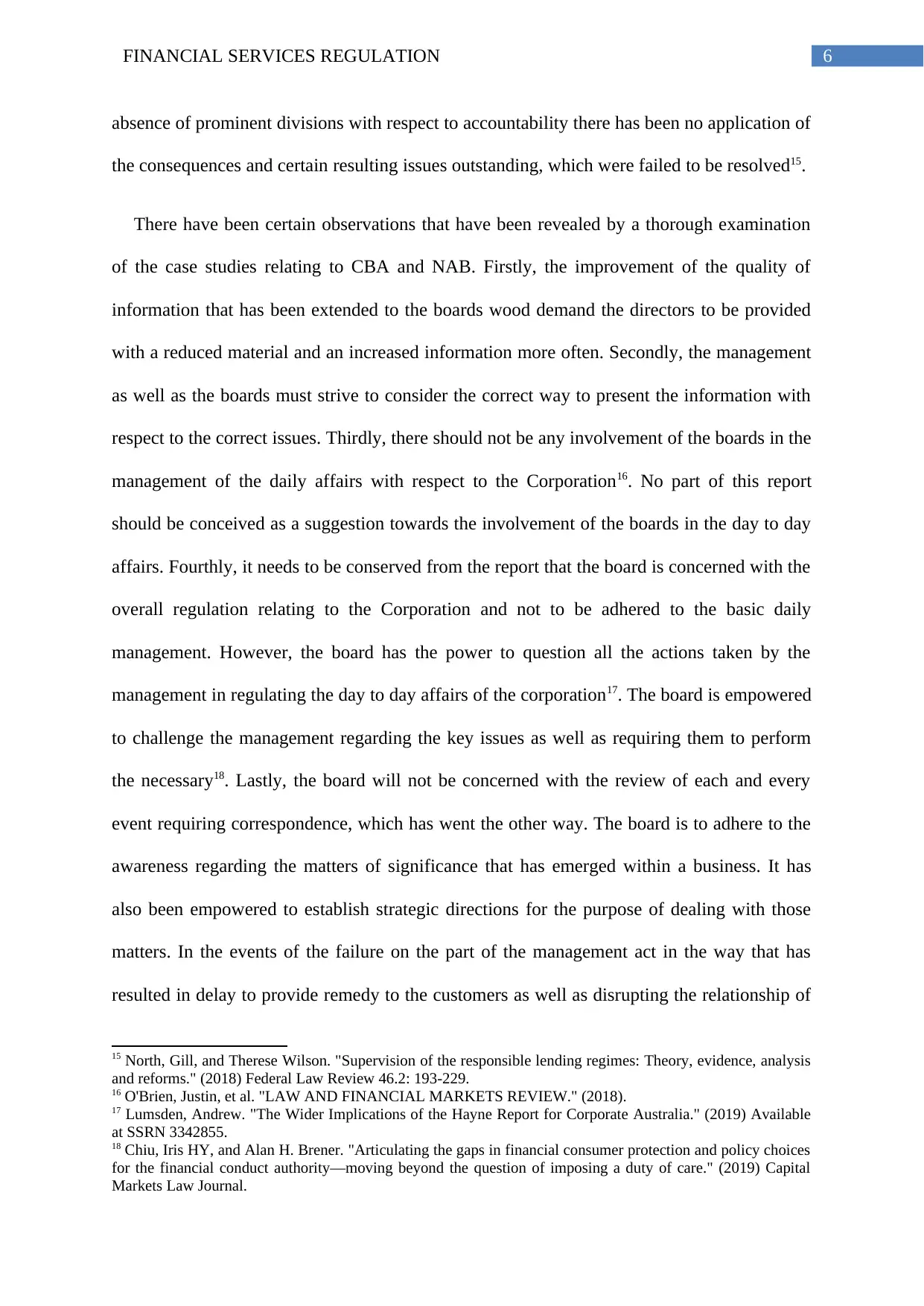
6FINANCIAL SERVICES REGULATION
absence of prominent divisions with respect to accountability there has been no application of
the consequences and certain resulting issues outstanding, which were failed to be resolved15.
There have been certain observations that have been revealed by a thorough examination
of the case studies relating to CBA and NAB. Firstly, the improvement of the quality of
information that has been extended to the boards wood demand the directors to be provided
with a reduced material and an increased information more often. Secondly, the management
as well as the boards must strive to consider the correct way to present the information with
respect to the correct issues. Thirdly, there should not be any involvement of the boards in the
management of the daily affairs with respect to the Corporation16. No part of this report
should be conceived as a suggestion towards the involvement of the boards in the day to day
affairs. Fourthly, it needs to be conserved from the report that the board is concerned with the
overall regulation relating to the Corporation and not to be adhered to the basic daily
management. However, the board has the power to question all the actions taken by the
management in regulating the day to day affairs of the corporation17. The board is empowered
to challenge the management regarding the key issues as well as requiring them to perform
the necessary18. Lastly, the board will not be concerned with the review of each and every
event requiring correspondence, which has went the other way. The board is to adhere to the
awareness regarding the matters of significance that has emerged within a business. It has
also been empowered to establish strategic directions for the purpose of dealing with those
matters. In the events of the failure on the part of the management act in the way that has
resulted in delay to provide remedy to the customers as well as disrupting the relationship of
15 North, Gill, and Therese Wilson. "Supervision of the responsible lending regimes: Theory, evidence, analysis
and reforms." (2018) Federal Law Review 46.2: 193-229.
16 O'Brien, Justin, et al. "LAW AND FINANCIAL MARKETS REVIEW." (2018).
17 Lumsden, Andrew. "The Wider Implications of the Hayne Report for Corporate Australia." (2019) Available
at SSRN 3342855.
18 Chiu, Iris HY, and Alan H. Brener. "Articulating the gaps in financial consumer protection and policy choices
for the financial conduct authority—moving beyond the question of imposing a duty of care." (2019) Capital
Markets Law Journal.
absence of prominent divisions with respect to accountability there has been no application of
the consequences and certain resulting issues outstanding, which were failed to be resolved15.
There have been certain observations that have been revealed by a thorough examination
of the case studies relating to CBA and NAB. Firstly, the improvement of the quality of
information that has been extended to the boards wood demand the directors to be provided
with a reduced material and an increased information more often. Secondly, the management
as well as the boards must strive to consider the correct way to present the information with
respect to the correct issues. Thirdly, there should not be any involvement of the boards in the
management of the daily affairs with respect to the Corporation16. No part of this report
should be conceived as a suggestion towards the involvement of the boards in the day to day
affairs. Fourthly, it needs to be conserved from the report that the board is concerned with the
overall regulation relating to the Corporation and not to be adhered to the basic daily
management. However, the board has the power to question all the actions taken by the
management in regulating the day to day affairs of the corporation17. The board is empowered
to challenge the management regarding the key issues as well as requiring them to perform
the necessary18. Lastly, the board will not be concerned with the review of each and every
event requiring correspondence, which has went the other way. The board is to adhere to the
awareness regarding the matters of significance that has emerged within a business. It has
also been empowered to establish strategic directions for the purpose of dealing with those
matters. In the events of the failure on the part of the management act in the way that has
resulted in delay to provide remedy to the customers as well as disrupting the relationship of
15 North, Gill, and Therese Wilson. "Supervision of the responsible lending regimes: Theory, evidence, analysis
and reforms." (2018) Federal Law Review 46.2: 193-229.
16 O'Brien, Justin, et al. "LAW AND FINANCIAL MARKETS REVIEW." (2018).
17 Lumsden, Andrew. "The Wider Implications of the Hayne Report for Corporate Australia." (2019) Available
at SSRN 3342855.
18 Chiu, Iris HY, and Alan H. Brener. "Articulating the gaps in financial consumer protection and policy choices
for the financial conduct authority—moving beyond the question of imposing a duty of care." (2019) Capital
Markets Law Journal.
Paraphrase This Document
Need a fresh take? Get an instant paraphrase of this document with our AI Paraphraser
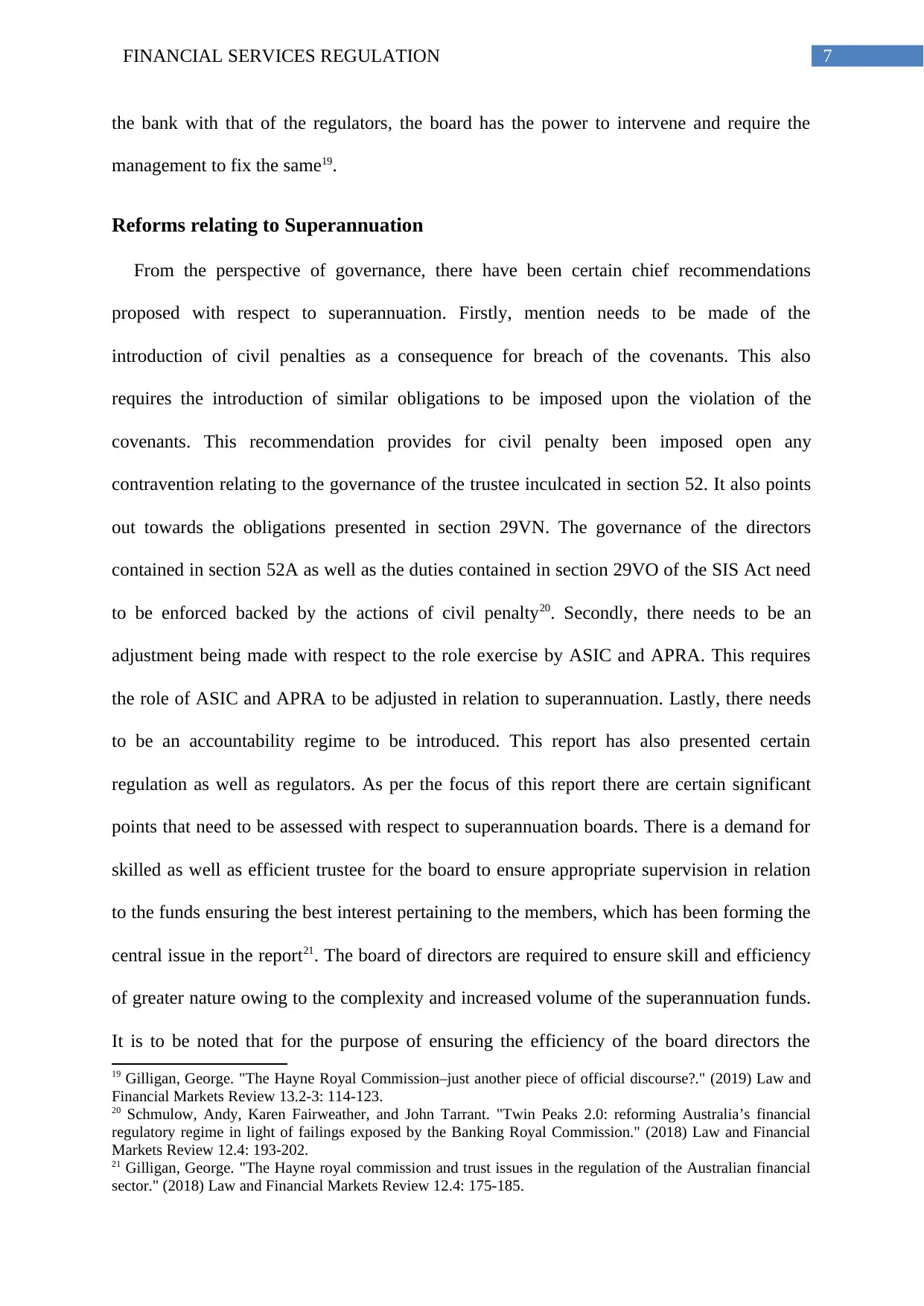
7FINANCIAL SERVICES REGULATION
the bank with that of the regulators, the board has the power to intervene and require the
management to fix the same19.
Reforms relating to Superannuation
From the perspective of governance, there have been certain chief recommendations
proposed with respect to superannuation. Firstly, mention needs to be made of the
introduction of civil penalties as a consequence for breach of the covenants. This also
requires the introduction of similar obligations to be imposed upon the violation of the
covenants. This recommendation provides for civil penalty been imposed open any
contravention relating to the governance of the trustee inculcated in section 52. It also points
out towards the obligations presented in section 29VN. The governance of the directors
contained in section 52A as well as the duties contained in section 29VO of the SIS Act need
to be enforced backed by the actions of civil penalty20. Secondly, there needs to be an
adjustment being made with respect to the role exercise by ASIC and APRA. This requires
the role of ASIC and APRA to be adjusted in relation to superannuation. Lastly, there needs
to be an accountability regime to be introduced. This report has also presented certain
regulation as well as regulators. As per the focus of this report there are certain significant
points that need to be assessed with respect to superannuation boards. There is a demand for
skilled as well as efficient trustee for the board to ensure appropriate supervision in relation
to the funds ensuring the best interest pertaining to the members, which has been forming the
central issue in the report21. The board of directors are required to ensure skill and efficiency
of greater nature owing to the complexity and increased volume of the superannuation funds.
It is to be noted that for the purpose of ensuring the efficiency of the board directors the
19 Gilligan, George. "The Hayne Royal Commission–just another piece of official discourse?." (2019) Law and
Financial Markets Review 13.2-3: 114-123.
20 Schmulow, Andy, Karen Fairweather, and John Tarrant. "Twin Peaks 2.0: reforming Australia’s financial
regulatory regime in light of failings exposed by the Banking Royal Commission." (2018) Law and Financial
Markets Review 12.4: 193-202.
21 Gilligan, George. "The Hayne royal commission and trust issues in the regulation of the Australian financial
sector." (2018) Law and Financial Markets Review 12.4: 175-185.
the bank with that of the regulators, the board has the power to intervene and require the
management to fix the same19.
Reforms relating to Superannuation
From the perspective of governance, there have been certain chief recommendations
proposed with respect to superannuation. Firstly, mention needs to be made of the
introduction of civil penalties as a consequence for breach of the covenants. This also
requires the introduction of similar obligations to be imposed upon the violation of the
covenants. This recommendation provides for civil penalty been imposed open any
contravention relating to the governance of the trustee inculcated in section 52. It also points
out towards the obligations presented in section 29VN. The governance of the directors
contained in section 52A as well as the duties contained in section 29VO of the SIS Act need
to be enforced backed by the actions of civil penalty20. Secondly, there needs to be an
adjustment being made with respect to the role exercise by ASIC and APRA. This requires
the role of ASIC and APRA to be adjusted in relation to superannuation. Lastly, there needs
to be an accountability regime to be introduced. This report has also presented certain
regulation as well as regulators. As per the focus of this report there are certain significant
points that need to be assessed with respect to superannuation boards. There is a demand for
skilled as well as efficient trustee for the board to ensure appropriate supervision in relation
to the funds ensuring the best interest pertaining to the members, which has been forming the
central issue in the report21. The board of directors are required to ensure skill and efficiency
of greater nature owing to the complexity and increased volume of the superannuation funds.
It is to be noted that for the purpose of ensuring the efficiency of the board directors the
19 Gilligan, George. "The Hayne Royal Commission–just another piece of official discourse?." (2019) Law and
Financial Markets Review 13.2-3: 114-123.
20 Schmulow, Andy, Karen Fairweather, and John Tarrant. "Twin Peaks 2.0: reforming Australia’s financial
regulatory regime in light of failings exposed by the Banking Royal Commission." (2018) Law and Financial
Markets Review 12.4: 193-202.
21 Gilligan, George. "The Hayne royal commission and trust issues in the regulation of the Australian financial
sector." (2018) Law and Financial Markets Review 12.4: 175-185.
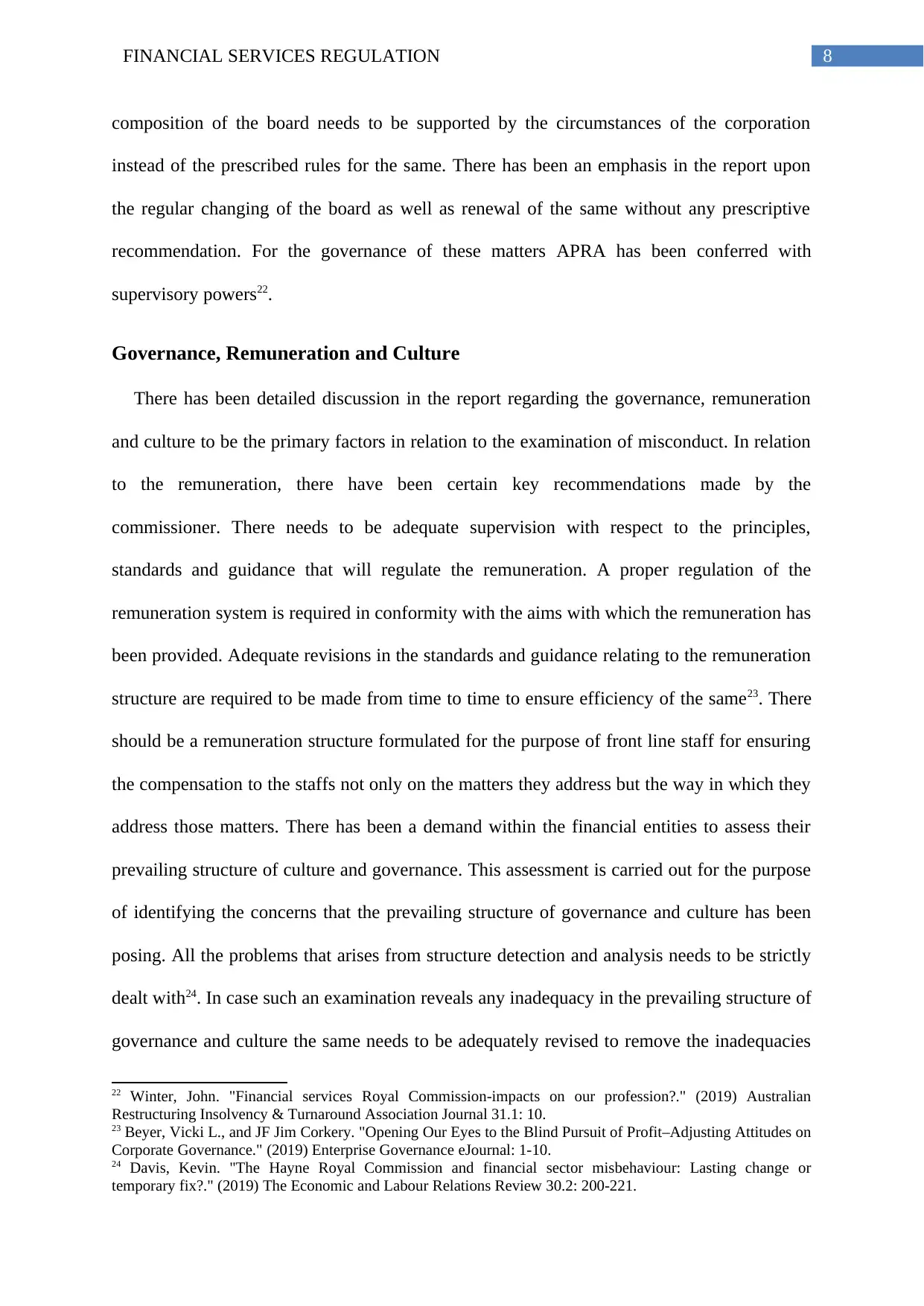
8FINANCIAL SERVICES REGULATION
composition of the board needs to be supported by the circumstances of the corporation
instead of the prescribed rules for the same. There has been an emphasis in the report upon
the regular changing of the board as well as renewal of the same without any prescriptive
recommendation. For the governance of these matters APRA has been conferred with
supervisory powers22.
Governance, Remuneration and Culture
There has been detailed discussion in the report regarding the governance, remuneration
and culture to be the primary factors in relation to the examination of misconduct. In relation
to the remuneration, there have been certain key recommendations made by the
commissioner. There needs to be adequate supervision with respect to the principles,
standards and guidance that will regulate the remuneration. A proper regulation of the
remuneration system is required in conformity with the aims with which the remuneration has
been provided. Adequate revisions in the standards and guidance relating to the remuneration
structure are required to be made from time to time to ensure efficiency of the same23. There
should be a remuneration structure formulated for the purpose of front line staff for ensuring
the compensation to the staffs not only on the matters they address but the way in which they
address those matters. There has been a demand within the financial entities to assess their
prevailing structure of culture and governance. This assessment is carried out for the purpose
of identifying the concerns that the prevailing structure of governance and culture has been
posing. All the problems that arises from structure detection and analysis needs to be strictly
dealt with24. In case such an examination reveals any inadequacy in the prevailing structure of
governance and culture the same needs to be adequately revised to remove the inadequacies
22 Winter, John. "Financial services Royal Commission-impacts on our profession?." (2019) Australian
Restructuring Insolvency & Turnaround Association Journal 31.1: 10.
23 Beyer, Vicki L., and JF Jim Corkery. "Opening Our Eyes to the Blind Pursuit of Profit–Adjusting Attitudes on
Corporate Governance." (2019) Enterprise Governance eJournal: 1-10.
24 Davis, Kevin. "The Hayne Royal Commission and financial sector misbehaviour: Lasting change or
temporary fix?." (2019) The Economic and Labour Relations Review 30.2: 200-221.
composition of the board needs to be supported by the circumstances of the corporation
instead of the prescribed rules for the same. There has been an emphasis in the report upon
the regular changing of the board as well as renewal of the same without any prescriptive
recommendation. For the governance of these matters APRA has been conferred with
supervisory powers22.
Governance, Remuneration and Culture
There has been detailed discussion in the report regarding the governance, remuneration
and culture to be the primary factors in relation to the examination of misconduct. In relation
to the remuneration, there have been certain key recommendations made by the
commissioner. There needs to be adequate supervision with respect to the principles,
standards and guidance that will regulate the remuneration. A proper regulation of the
remuneration system is required in conformity with the aims with which the remuneration has
been provided. Adequate revisions in the standards and guidance relating to the remuneration
structure are required to be made from time to time to ensure efficiency of the same23. There
should be a remuneration structure formulated for the purpose of front line staff for ensuring
the compensation to the staffs not only on the matters they address but the way in which they
address those matters. There has been a demand within the financial entities to assess their
prevailing structure of culture and governance. This assessment is carried out for the purpose
of identifying the concerns that the prevailing structure of governance and culture has been
posing. All the problems that arises from structure detection and analysis needs to be strictly
dealt with24. In case such an examination reveals any inadequacy in the prevailing structure of
governance and culture the same needs to be adequately revised to remove the inadequacies
22 Winter, John. "Financial services Royal Commission-impacts on our profession?." (2019) Australian
Restructuring Insolvency & Turnaround Association Journal 31.1: 10.
23 Beyer, Vicki L., and JF Jim Corkery. "Opening Our Eyes to the Blind Pursuit of Profit–Adjusting Attitudes on
Corporate Governance." (2019) Enterprise Governance eJournal: 1-10.
24 Davis, Kevin. "The Hayne Royal Commission and financial sector misbehaviour: Lasting change or
temporary fix?." (2019) The Economic and Labour Relations Review 30.2: 200-221.
⊘ This is a preview!⊘
Do you want full access?
Subscribe today to unlock all pages.

Trusted by 1+ million students worldwide
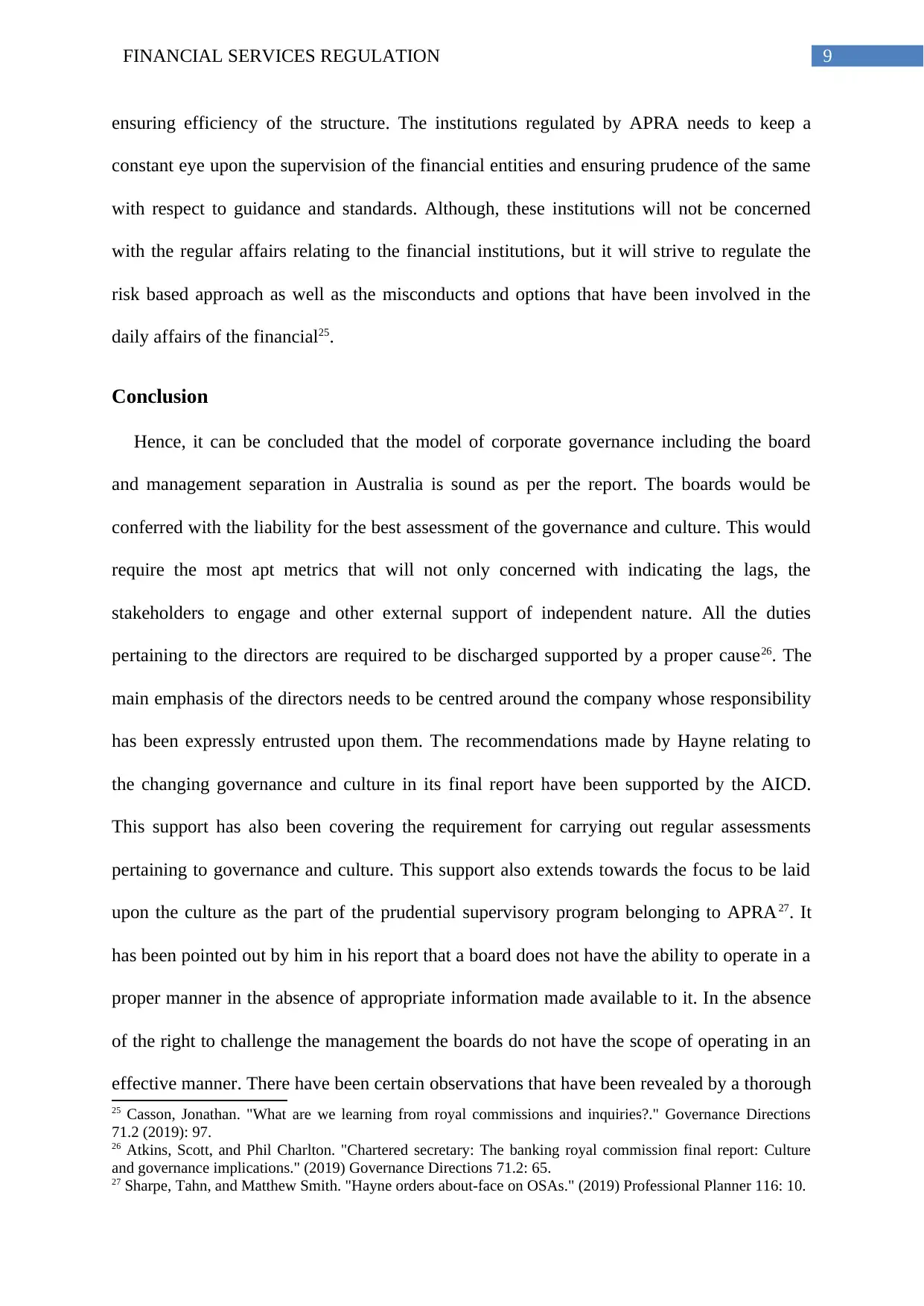
9FINANCIAL SERVICES REGULATION
ensuring efficiency of the structure. The institutions regulated by APRA needs to keep a
constant eye upon the supervision of the financial entities and ensuring prudence of the same
with respect to guidance and standards. Although, these institutions will not be concerned
with the regular affairs relating to the financial institutions, but it will strive to regulate the
risk based approach as well as the misconducts and options that have been involved in the
daily affairs of the financial25.
Conclusion
Hence, it can be concluded that the model of corporate governance including the board
and management separation in Australia is sound as per the report. The boards would be
conferred with the liability for the best assessment of the governance and culture. This would
require the most apt metrics that will not only concerned with indicating the lags, the
stakeholders to engage and other external support of independent nature. All the duties
pertaining to the directors are required to be discharged supported by a proper cause26. The
main emphasis of the directors needs to be centred around the company whose responsibility
has been expressly entrusted upon them. The recommendations made by Hayne relating to
the changing governance and culture in its final report have been supported by the AICD.
This support has also been covering the requirement for carrying out regular assessments
pertaining to governance and culture. This support also extends towards the focus to be laid
upon the culture as the part of the prudential supervisory program belonging to APRA27. It
has been pointed out by him in his report that a board does not have the ability to operate in a
proper manner in the absence of appropriate information made available to it. In the absence
of the right to challenge the management the boards do not have the scope of operating in an
effective manner. There have been certain observations that have been revealed by a thorough
25 Casson, Jonathan. "What are we learning from royal commissions and inquiries?." Governance Directions
71.2 (2019): 97.
26 Atkins, Scott, and Phil Charlton. "Chartered secretary: The banking royal commission final report: Culture
and governance implications." (2019) Governance Directions 71.2: 65.
27 Sharpe, Tahn, and Matthew Smith. "Hayne orders about-face on OSAs." (2019) Professional Planner 116: 10.
ensuring efficiency of the structure. The institutions regulated by APRA needs to keep a
constant eye upon the supervision of the financial entities and ensuring prudence of the same
with respect to guidance and standards. Although, these institutions will not be concerned
with the regular affairs relating to the financial institutions, but it will strive to regulate the
risk based approach as well as the misconducts and options that have been involved in the
daily affairs of the financial25.
Conclusion
Hence, it can be concluded that the model of corporate governance including the board
and management separation in Australia is sound as per the report. The boards would be
conferred with the liability for the best assessment of the governance and culture. This would
require the most apt metrics that will not only concerned with indicating the lags, the
stakeholders to engage and other external support of independent nature. All the duties
pertaining to the directors are required to be discharged supported by a proper cause26. The
main emphasis of the directors needs to be centred around the company whose responsibility
has been expressly entrusted upon them. The recommendations made by Hayne relating to
the changing governance and culture in its final report have been supported by the AICD.
This support has also been covering the requirement for carrying out regular assessments
pertaining to governance and culture. This support also extends towards the focus to be laid
upon the culture as the part of the prudential supervisory program belonging to APRA27. It
has been pointed out by him in his report that a board does not have the ability to operate in a
proper manner in the absence of appropriate information made available to it. In the absence
of the right to challenge the management the boards do not have the scope of operating in an
effective manner. There have been certain observations that have been revealed by a thorough
25 Casson, Jonathan. "What are we learning from royal commissions and inquiries?." Governance Directions
71.2 (2019): 97.
26 Atkins, Scott, and Phil Charlton. "Chartered secretary: The banking royal commission final report: Culture
and governance implications." (2019) Governance Directions 71.2: 65.
27 Sharpe, Tahn, and Matthew Smith. "Hayne orders about-face on OSAs." (2019) Professional Planner 116: 10.
Paraphrase This Document
Need a fresh take? Get an instant paraphrase of this document with our AI Paraphraser
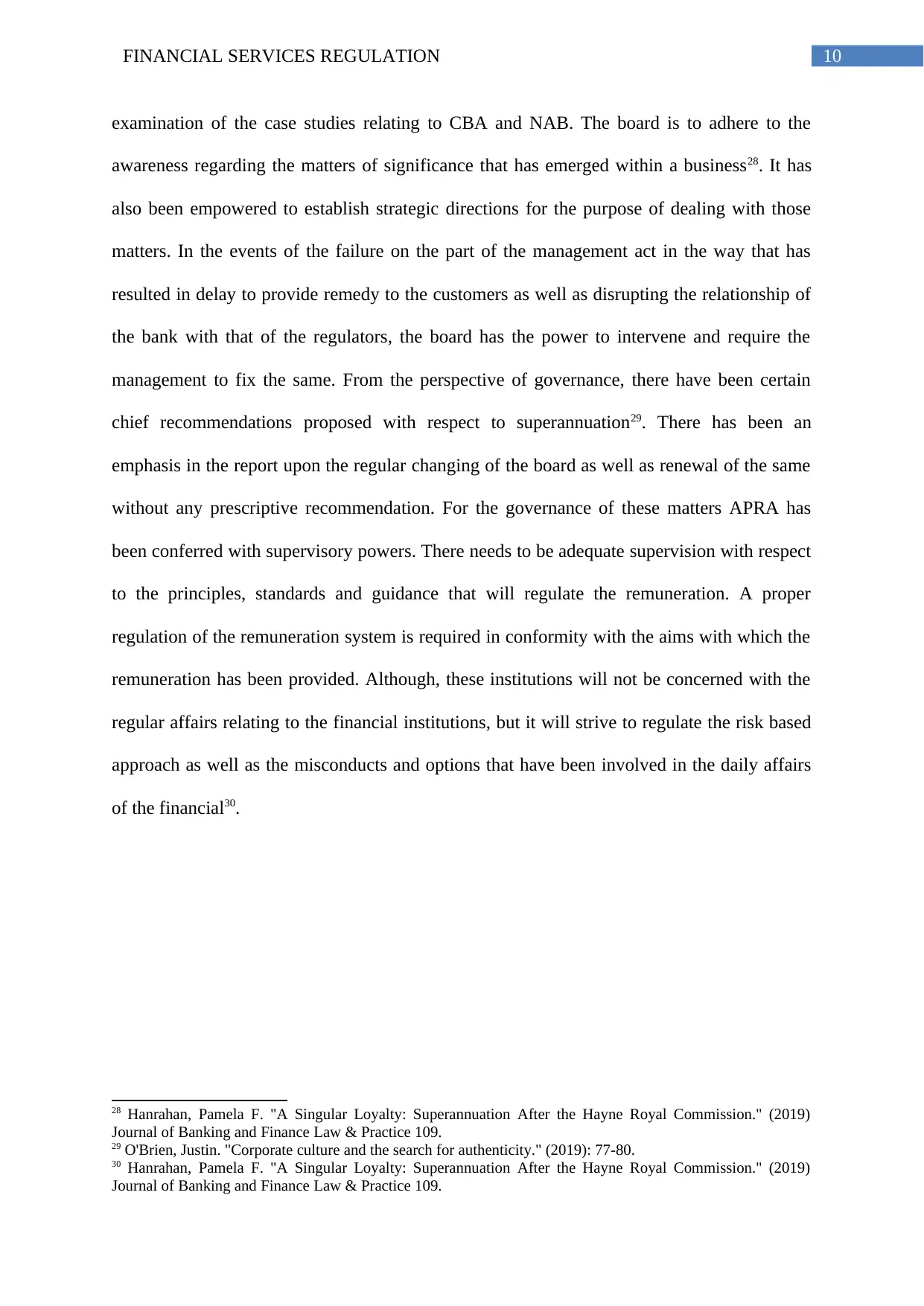
10FINANCIAL SERVICES REGULATION
examination of the case studies relating to CBA and NAB. The board is to adhere to the
awareness regarding the matters of significance that has emerged within a business28. It has
also been empowered to establish strategic directions for the purpose of dealing with those
matters. In the events of the failure on the part of the management act in the way that has
resulted in delay to provide remedy to the customers as well as disrupting the relationship of
the bank with that of the regulators, the board has the power to intervene and require the
management to fix the same. From the perspective of governance, there have been certain
chief recommendations proposed with respect to superannuation29. There has been an
emphasis in the report upon the regular changing of the board as well as renewal of the same
without any prescriptive recommendation. For the governance of these matters APRA has
been conferred with supervisory powers. There needs to be adequate supervision with respect
to the principles, standards and guidance that will regulate the remuneration. A proper
regulation of the remuneration system is required in conformity with the aims with which the
remuneration has been provided. Although, these institutions will not be concerned with the
regular affairs relating to the financial institutions, but it will strive to regulate the risk based
approach as well as the misconducts and options that have been involved in the daily affairs
of the financial30.
28 Hanrahan, Pamela F. "A Singular Loyalty: Superannuation After the Hayne Royal Commission." (2019)
Journal of Banking and Finance Law & Practice 109.
29 O'Brien, Justin. "Corporate culture and the search for authenticity." (2019): 77-80.
30 Hanrahan, Pamela F. "A Singular Loyalty: Superannuation After the Hayne Royal Commission." (2019)
Journal of Banking and Finance Law & Practice 109.
examination of the case studies relating to CBA and NAB. The board is to adhere to the
awareness regarding the matters of significance that has emerged within a business28. It has
also been empowered to establish strategic directions for the purpose of dealing with those
matters. In the events of the failure on the part of the management act in the way that has
resulted in delay to provide remedy to the customers as well as disrupting the relationship of
the bank with that of the regulators, the board has the power to intervene and require the
management to fix the same. From the perspective of governance, there have been certain
chief recommendations proposed with respect to superannuation29. There has been an
emphasis in the report upon the regular changing of the board as well as renewal of the same
without any prescriptive recommendation. For the governance of these matters APRA has
been conferred with supervisory powers. There needs to be adequate supervision with respect
to the principles, standards and guidance that will regulate the remuneration. A proper
regulation of the remuneration system is required in conformity with the aims with which the
remuneration has been provided. Although, these institutions will not be concerned with the
regular affairs relating to the financial institutions, but it will strive to regulate the risk based
approach as well as the misconducts and options that have been involved in the daily affairs
of the financial30.
28 Hanrahan, Pamela F. "A Singular Loyalty: Superannuation After the Hayne Royal Commission." (2019)
Journal of Banking and Finance Law & Practice 109.
29 O'Brien, Justin. "Corporate culture and the search for authenticity." (2019): 77-80.
30 Hanrahan, Pamela F. "A Singular Loyalty: Superannuation After the Hayne Royal Commission." (2019)
Journal of Banking and Finance Law & Practice 109.
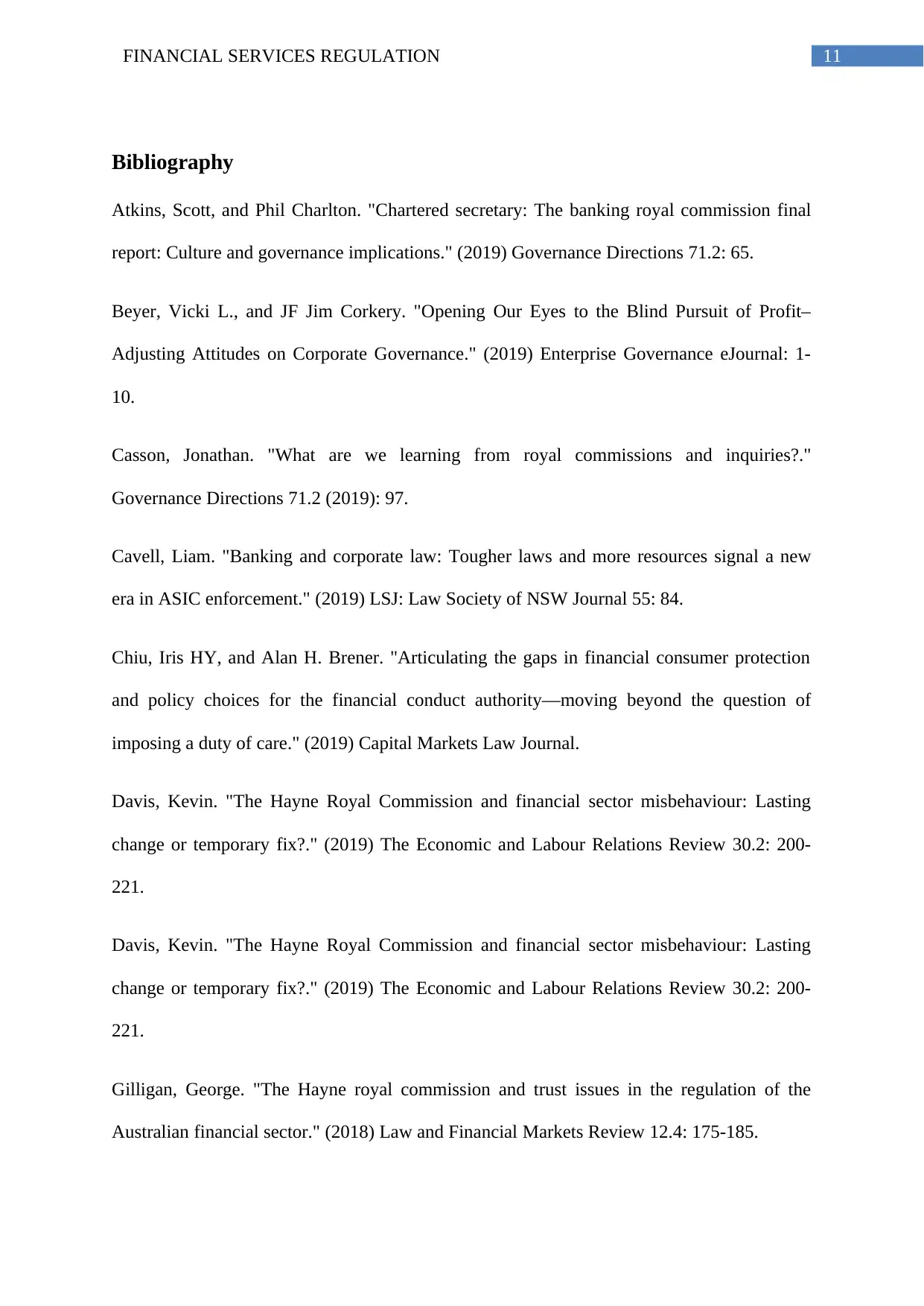
11FINANCIAL SERVICES REGULATION
Bibliography
Atkins, Scott, and Phil Charlton. "Chartered secretary: The banking royal commission final
report: Culture and governance implications." (2019) Governance Directions 71.2: 65.
Beyer, Vicki L., and JF Jim Corkery. "Opening Our Eyes to the Blind Pursuit of Profit–
Adjusting Attitudes on Corporate Governance." (2019) Enterprise Governance eJournal: 1-
10.
Casson, Jonathan. "What are we learning from royal commissions and inquiries?."
Governance Directions 71.2 (2019): 97.
Cavell, Liam. "Banking and corporate law: Tougher laws and more resources signal a new
era in ASIC enforcement." (2019) LSJ: Law Society of NSW Journal 55: 84.
Chiu, Iris HY, and Alan H. Brener. "Articulating the gaps in financial consumer protection
and policy choices for the financial conduct authority—moving beyond the question of
imposing a duty of care." (2019) Capital Markets Law Journal.
Davis, Kevin. "The Hayne Royal Commission and financial sector misbehaviour: Lasting
change or temporary fix?." (2019) The Economic and Labour Relations Review 30.2: 200-
221.
Davis, Kevin. "The Hayne Royal Commission and financial sector misbehaviour: Lasting
change or temporary fix?." (2019) The Economic and Labour Relations Review 30.2: 200-
221.
Gilligan, George. "The Hayne royal commission and trust issues in the regulation of the
Australian financial sector." (2018) Law and Financial Markets Review 12.4: 175-185.
Bibliography
Atkins, Scott, and Phil Charlton. "Chartered secretary: The banking royal commission final
report: Culture and governance implications." (2019) Governance Directions 71.2: 65.
Beyer, Vicki L., and JF Jim Corkery. "Opening Our Eyes to the Blind Pursuit of Profit–
Adjusting Attitudes on Corporate Governance." (2019) Enterprise Governance eJournal: 1-
10.
Casson, Jonathan. "What are we learning from royal commissions and inquiries?."
Governance Directions 71.2 (2019): 97.
Cavell, Liam. "Banking and corporate law: Tougher laws and more resources signal a new
era in ASIC enforcement." (2019) LSJ: Law Society of NSW Journal 55: 84.
Chiu, Iris HY, and Alan H. Brener. "Articulating the gaps in financial consumer protection
and policy choices for the financial conduct authority—moving beyond the question of
imposing a duty of care." (2019) Capital Markets Law Journal.
Davis, Kevin. "The Hayne Royal Commission and financial sector misbehaviour: Lasting
change or temporary fix?." (2019) The Economic and Labour Relations Review 30.2: 200-
221.
Davis, Kevin. "The Hayne Royal Commission and financial sector misbehaviour: Lasting
change or temporary fix?." (2019) The Economic and Labour Relations Review 30.2: 200-
221.
Gilligan, George. "The Hayne royal commission and trust issues in the regulation of the
Australian financial sector." (2018) Law and Financial Markets Review 12.4: 175-185.
⊘ This is a preview!⊘
Do you want full access?
Subscribe today to unlock all pages.

Trusted by 1+ million students worldwide
1 out of 15
Related Documents
Your All-in-One AI-Powered Toolkit for Academic Success.
+13062052269
info@desklib.com
Available 24*7 on WhatsApp / Email
![[object Object]](/_next/static/media/star-bottom.7253800d.svg)
Unlock your academic potential
Copyright © 2020–2026 A2Z Services. All Rights Reserved. Developed and managed by ZUCOL.





